Spring Cleaning Your Natural Medicine Cabinet: Guidelines on What to Keep and What to Pitch
Looking at spring cleaning your natural medicine cabinet? It’s a little tricky to know exactly what to keep and what to pitch: here’s some help!
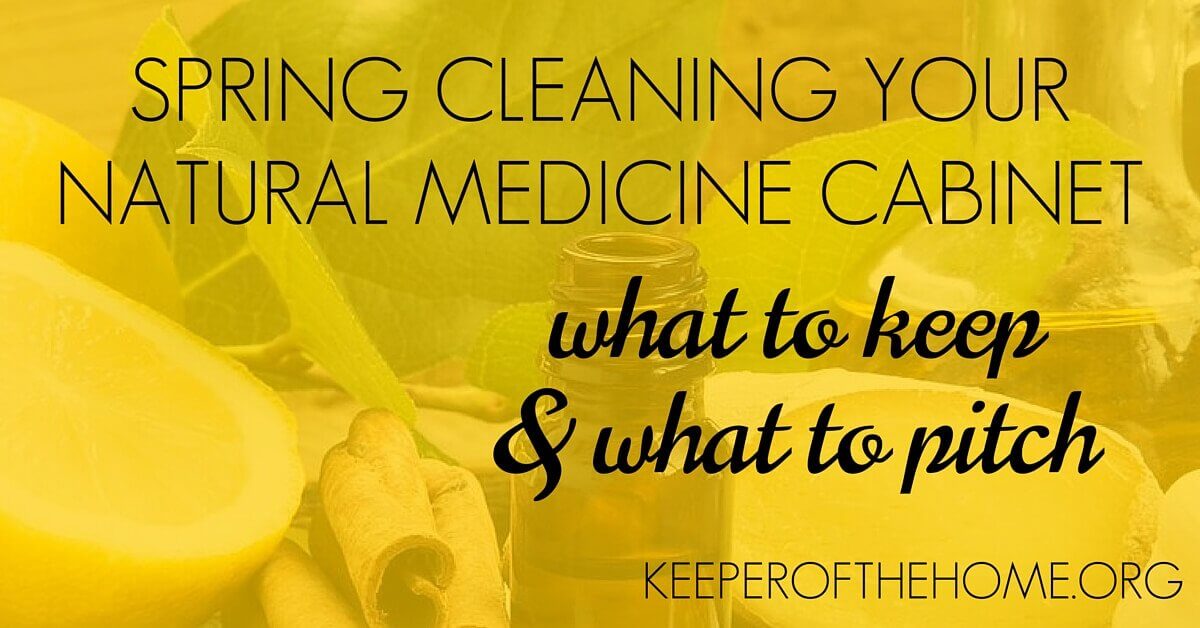
Note from Ann: Just in time for my Spring Cleaning, Stephanie! It’s been a while since I have cleaned out my ‘medicine’ cabinet so this will be my guide. From storage tips and charts to what to do if your bottle doesn’t have an expiration date, be sure to read all the way through if you haven’t cleaned out your cabinet in a while!
Since I’ve begun to “KonMari” everything else in my house, it seemed only fitting that my natural medicine cabinet would be the next to be decluttered and purged.
However, it’s a little tricky to know exactly what to keep and what to pitch.
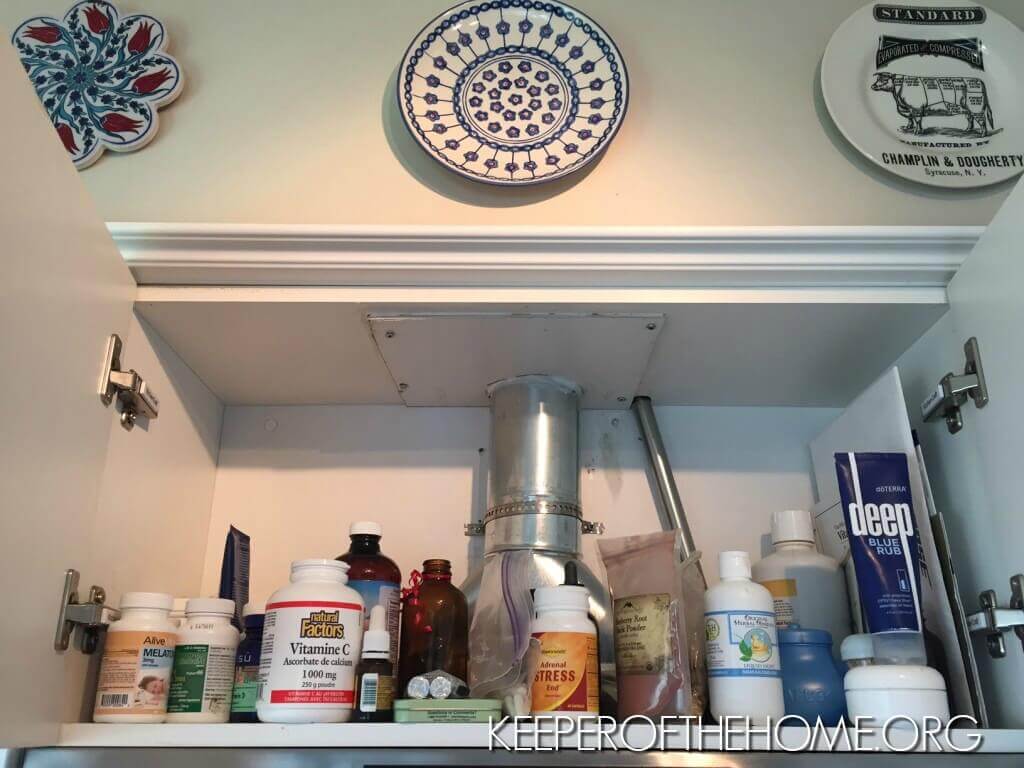
You see, unlike their pharmaceutical counterparts, natural remedies such as supplements, vitamins, herbal tinctures, etc. are not legally required by the FDA to carry an expiry date. Instead, they come with a manufacture date or a lot number (indicating when they were made/packaged), leaving the final decision up to the consumer.
According to Tod Cooperman, president an independent testing company, “If you see some type of expiration date, the manufacturer is legally required to have stability data demonstrating the product will still have 100 percent of its listed ingredients until that date.” (source)
The reason this is difficult to guarantee with many of the products we use in our arsenal of natural remedies is that they’re sensitive to a number of factors, particularly how we store and keep them.
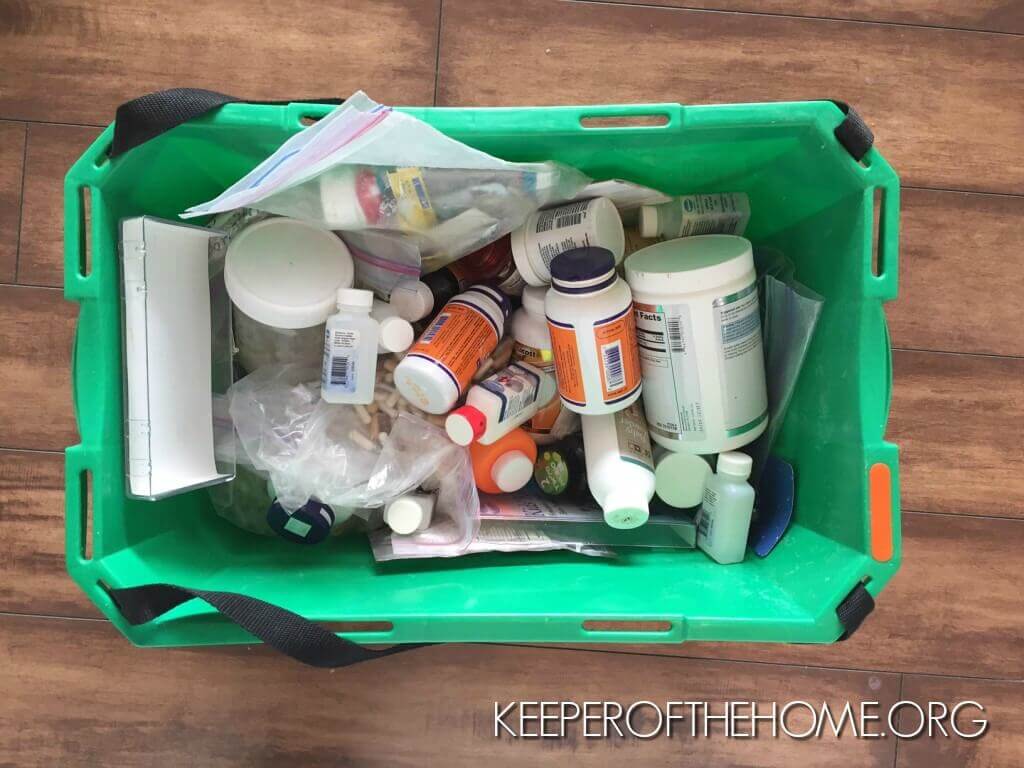
Storage Tips for Natural Remedies in General
As I did my research and prepared to cut down my stash, I learned a lot about how our remedies and natural products should be stored. Ultimately it all boils down to a few key principles:
- Avoid extreme temperatures. Both heat or cold can affect the potency and shelf life of almost every product I looked at, whether it’s essential oils, herbs, vitamins, homeopathics, probiotics or anything else. Unless specifically stated, don’t keep anything in the fridge or freezer, and also keep it away from particularly warm parts of your house (ie. the cupboard above your stove or where you use your kettle, for example).
- Avoid excessive air exposure. The reasons vary from product to product, but the general rule is that you want to keep your containers, jars or packages well-sealed to prevent oxidation, evaporation, decrease in potency, loss of fragrance or flavor, or to keep mold from forming. When you open a lid, make sure that it is replaced quickly and is properly sealed.
- Avoid moisture. Moisture can weaken or reduce viability and encourage mold.
- Avoid direct sunlight. Ultraviolet light in particular can damage sensitive essential oils, compromise effectiveness of herbs, and cause loss of flavor.
It’s generally recommended that you keep all of your natural medicine ingredients well-sealed (to keep them dry and prevent oxygen exposure) and then store them in a cupboard where they will remain cool (or at least no more than room temperature) and away from direct light.
Following these guidelines should work for most things, except for a few specific notes that I’ll make below for those items that are a bit more finicky.
But on to the guide for what to expect in terms of shelf life and what hold on to (or get rid of). Using these guidelines, I can finish decluttering my own medicine cabinet, and so can you!
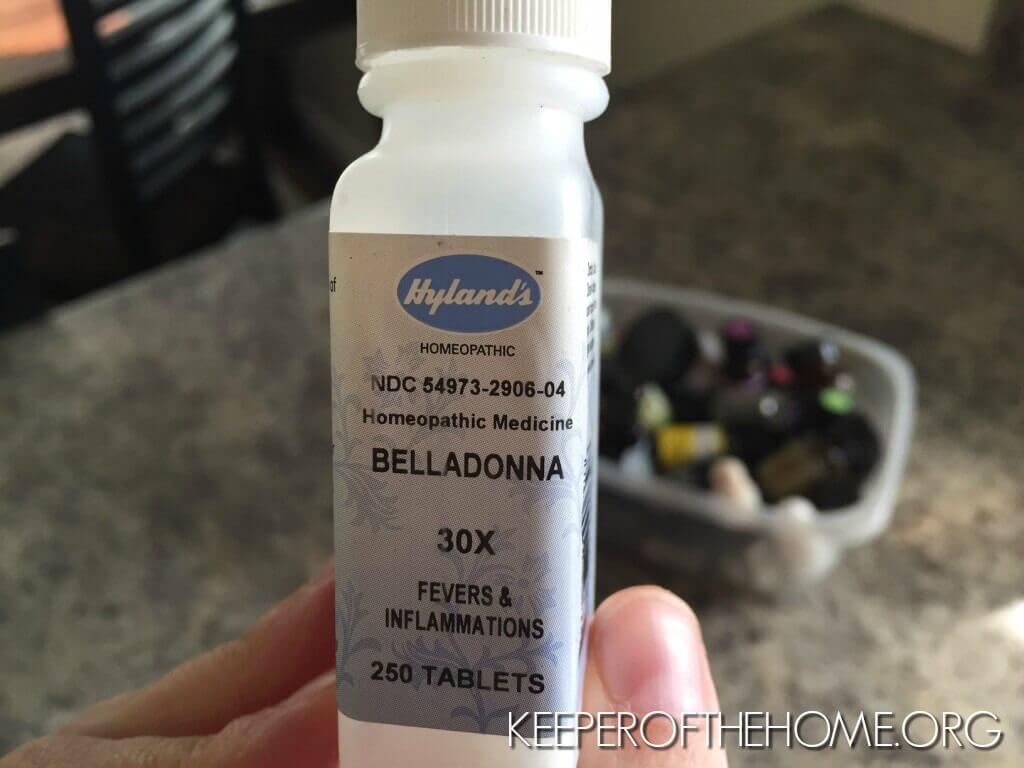
Homeopathic Remedies:
The idea is that homeopathic medicines are good basically indefinitely, so long as they stay under ideal conditions. The tablets, globules or powder can last for many years. The alcohol based tinctures can last as long as its alcohol base (a very long time). (1, 2)
That said, the quality of homeopathic remedies is easily compromised and they’re surprisingly fragile.
If they are exposed to extreme heat or cold, to any moisture, if they are touched (once they’ve come out of the bottle and been handled, they should not be returned), etc. Keep them away from light (put them in a dark cupboard), away from strong scents (don’t store near essential oils, for example), don’t keep in the fridge, and keep away from appliances that use powerful magnets or that emit radiation.
Note: If you do ever see green or black spots, your remedy has been compromised by mold and should be thrown out immediately (which typically happens if they are not sealed properly, have been handled and returned to the bottle, or exposed to moisture).
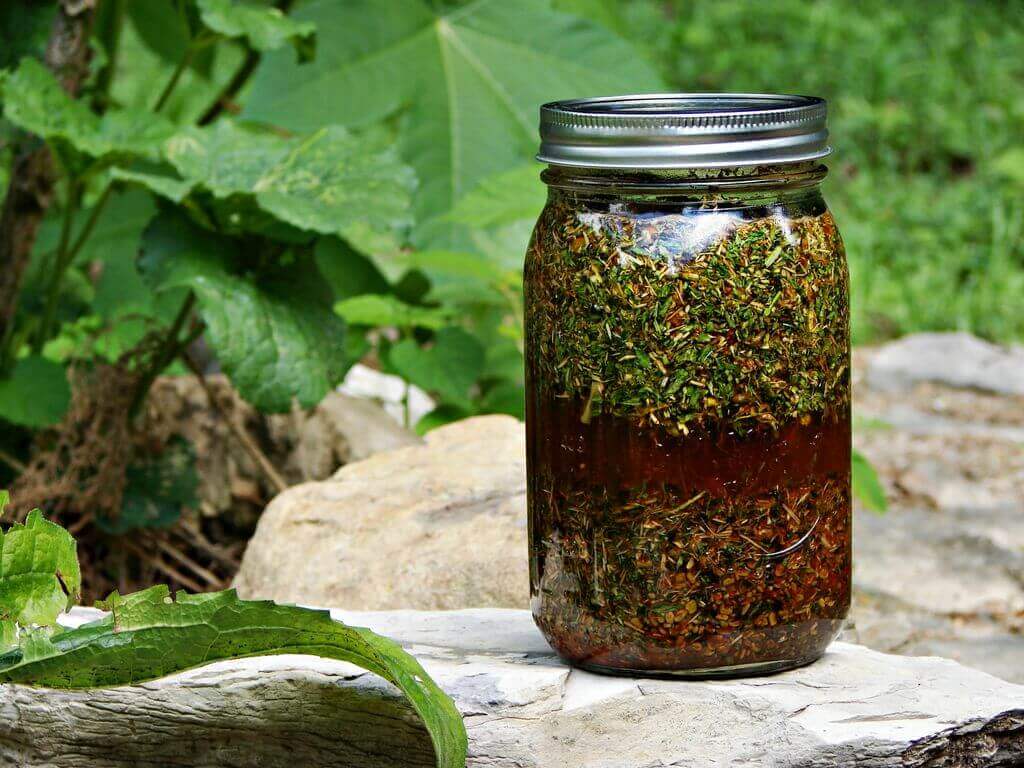
Tinctures
Tinctures are liquid extracts made from herbs, which are taken orally. They are usually extracted in alcohol, but can also be extracted in vegetable glycerine or apple cider vinegar.
- Alcohol-based tinctures have a minimum 5 year shelf life, but most sources suggest that they have a virtually unlimited shelf life if stored in a cool, dark location. Refrigeration is not necessary.
- A tincture made with apple cider vinegar (so for example, a cold-kicker or fire water remedy) – up to one year if kept in the fridge or somewhere dark and cool.
- Tinctures made with glycerin (called glycerites) have a much longer shelf life than the apple cider vinegar – 3 to 5 years if stored in a cool, dark cupboard.
- Safety is not typically the issue after these periods of time, but it’s that the tinctures begin to lose effectiveness.
Essential Oils
Properly stored essential oils have a shelf life of at least 1 year and up to 5-6 years, or even 7-10 years occasionally. In my research, most oils seem to land around the 3-6 year mark.
That said, a few popular ones with a shorter shelf lives include Lemon and Orange, both 1 year. Tea Tree, Lime and Frankincense are 2 years. I’ve also seen Fir and Pine on the list of oils that will last less than 2 years or less.
BUT it really comes down to what type of oil you’re talking about. There are many different families of oils, such as monoterpenes, oxides, phenols, and esters. It’s crucial to know which oils belong to which family, and that’s the most important thing that impacts shelf life.
One key to remember is that because they are a volatile substance, they can both oxidize and evaporate. Once oils oxidize, they are also more likely to cause irritation or to bring about a sensitive reaction.
The best resource I found for determining the shelf life of specific oils was in this very helpful article from Lea Harris, a certified aromatherapist. She has a list of specific oils by alphabetical order with their specific shelf life.
As well, Katie at Kitchen Stewardship has created a handy chart which groups essential oils by family/type, so you can see at a quicker glance which oils will last the longest, and which ones you should buy in smaller amounts and keep a closer eye on.
How to know if an oil has deteriorated or been compromised in quality (source):
- The aroma has drastically changed
- The oil has thickened
- The oil has become cloudy
Another thing to consider is the carrier oil. Most cold pressed carrier oils have a shelf life of between 9 and 15 months, but again, this depends on the particular oil in question and how well it is stored. Grapeseed oil is only around 6 to 9 months, with Borage, Carrot and Evening Primrose oil close behind at around 10 to 12 months. Coconut and Jojoba will keep for many, many years. (source)
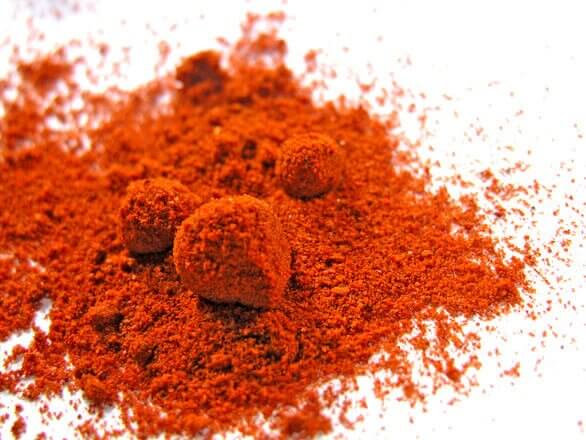
Dried Herbs / Spices
Keys for dry herb/spice storage is keep away from direct light, extreme heat or cold, away from moisture (properly sealed jars or containers). Dark colored glass is ideal, or keep see-through glass jars in a closed cupboard or pantry.
They also last longer when they have not been cracked or ground, but are left whole until they are needed (for those that don’t come as a powder).
You’ll want to look for color, fragrance, and taste to test for freshness. Unless an herb/spice looks moldy, there’s probably no safety concern, but they’ll lose their effectiveness as well as their flavor.
- Whole spices and dried herbs, leaves and flowers will keep 1 – 2 years (I read up to 3 years in some places).
- Seeds will keep 2 – 3 years and dried whole roots (i.e. ginger root or galangal root) will keep 3 years.
- Ground spices and herb leaves keep 1 year (some sources say up to 2 years).

Tea
Tea does typically have an expiration date because it’s technically a food. Unopened tea can easily last a year or more beyond it’s expiration date. Dry leaves in particular last a very long time if well-stored. Some actually say that they age and get better, although I had a hard time finding any sources to actually prove that.
There really aren’t any health-related concerns anywhere with regard to the storage of tea leaves and bags; the main thing is how best to preserve its taste and medicinal qualities.
One last thing to consider is whether the tea has things like dried fruit or fruit peels, herbs, essences or oils (like bergamot which adds the specific flavor that makes Earl Grey distinctive). Teas with these sorts of ingredients are likely to spoil faster.

Supplements/Vitamins
When it comes to vitamin supplements, what we’re primarily looking for is whether the vitamins themselves still available and effective. Nutrients can decrease over time, as well as with exposure to the elements (oxygen, light, heat, etc.), particularly vitamins like A, C and certain B vitamins.
As with other supplements and natural remedies, the U.S. Food and Drug Administration does not require that vitamin manufacturers place an expiration date on the products they sell, although some choose to do so (actually, I was surprised by how many I found in my cupboard that did have expiry dates). Since vitamins do lose potency over time, it’s definitely best to use them before their expiration date
I looked for some general guidelines, for those situations where there aren’t expiry dates:
- According to Swanson Vitamins, most products are good for 2 years, but only 1 year for probiotics and some liquid supplements.
- I did find that pressed vitamins–those that are usually called a “tablet”–lose potency more quickly than vitamins that are coated or come in capsule form.
Special Cases: Fish Oil
Fish oil is definitely prone to oxidation or rancidity, just like other fats and oils. Most fish oil products should be kept in sealed containers or bottles in the fridge (though some capsules may not need to be- check the packaging).
It seems that most fish oil products have a shelf life of 24 months, if they haven’t been opened or exposed to extreme light or heat (source).
The thing with fish oil is that the fresher it is, the less “fishy” it tastes and smells. Liquids will go bad faster than oil in capsules (because they are more open, less protected by the capsule). If an oil begins to taste or smell particularly fishy or terrible or particularly different than it did when you first opened it, chances are it is no longer good.
I recently had this happen with a bottle of liquid cod liver oil. It was a new-to-me brand and I didn’t love it, but I was able to get it down at first. But I found myself dragging my feet to take it and so the bottle sat in my fridge for a few months. By the time I got back to really being consistent with it, it tasted worse than I remembered it tasting and I was literally choking it down. After about a week, I wised up and realized that it wasn’t that bad originally and it had gone bad. Oops. (And yes, this time I bought I different brand, LOL!).

Special cases: Probiotics
Probiotics are measured in Colony Forming Units or CFUs. You’ll usually see numbers of CFUs in the millions or even billions on probiotic packaging. These numbers indicate the potency and activity of the probiotic – this is live bacteria that you’re seeking to use to re-populate your gut flora. The issue with probiotics is that these CFU numbers naturally decline over a period of time.
Whether a probiotic retains its benefits and how rapidly the CFU numbers decline depends on a few things:
- Temperature – typically probiotics should be refrigerated. There are some that don’t require it and are shelf stable (and can still be useful), but as a general rule, the most effective probiotics require refrigeration (some people will argue me on this and there are some excellent brands that are shelf stable, so this isn’t an across-the-board statement). If you’re buying yours online, make sure that they’ll be shipped cold, to ensure their quality, and do not leave them out somewhere warm or hot.
- Will it harm you if it is less active or less potent? The answer seems to be probably not. It may even still have some benefit, but the benefit will be greatly reduced. That doesn’t mean you shouldn’t still use them or finish them up, but if you’re needing something with full force to really counteract a specific issue or illness, or to help rebuild gut flora after a round of antibiotics, you will want to purchase fresh probiotics to make sure that you’re receiving the full benefit.
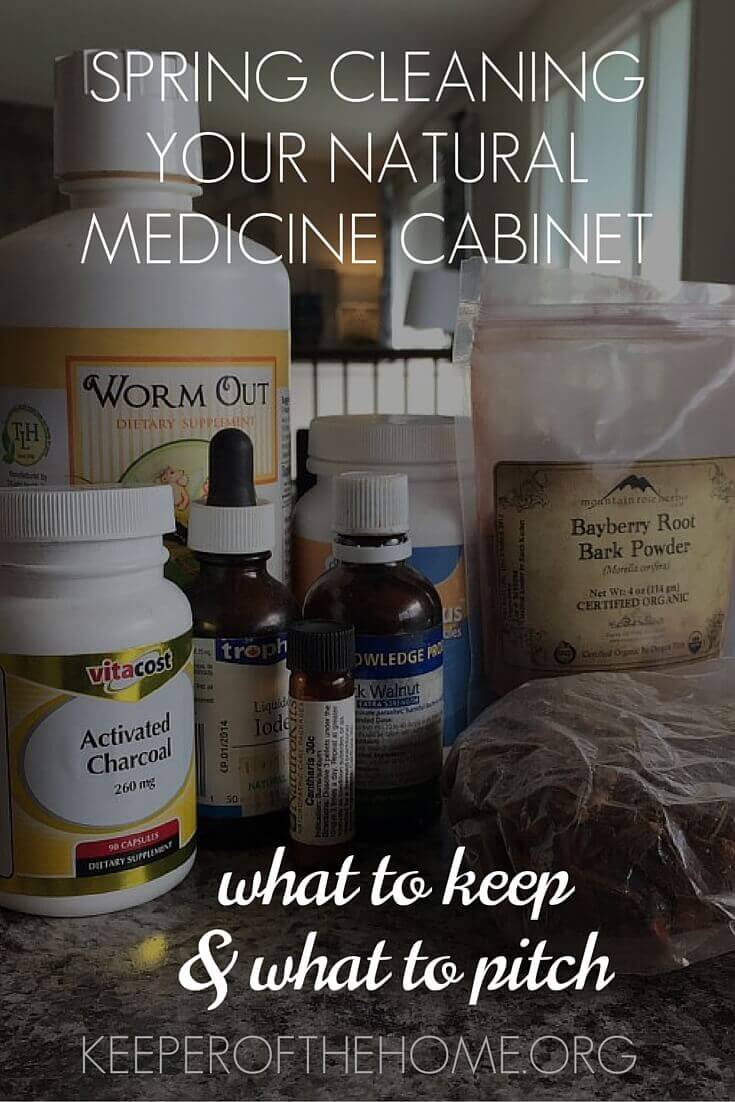
Disclaimer: Although all Keeper of the Home contributors are passionate about nutrition, natural living and alternative health issues, we are not certified nutritionists, medical doctors, or practitioners of any kind. We are not licensed to counsel anyone in medical matters, nor may we be held responsible for any course of action that you choose in regards to your own health or that of your family. Please remember that what we are sharing is the result of our own experiences and years of study, but may not necessarily be the right course of action for you. We are advocates of becoming informed, knowledgeable and responsible for one’s own health, but our desire is not to be an authority on any matters of health for you, nor would we presume to have sufficient knowledge to do so. Our hope is that what we share may encourage you and start you on the road to doing your own research, and seeking out the opinions of professionals or others that you trust.

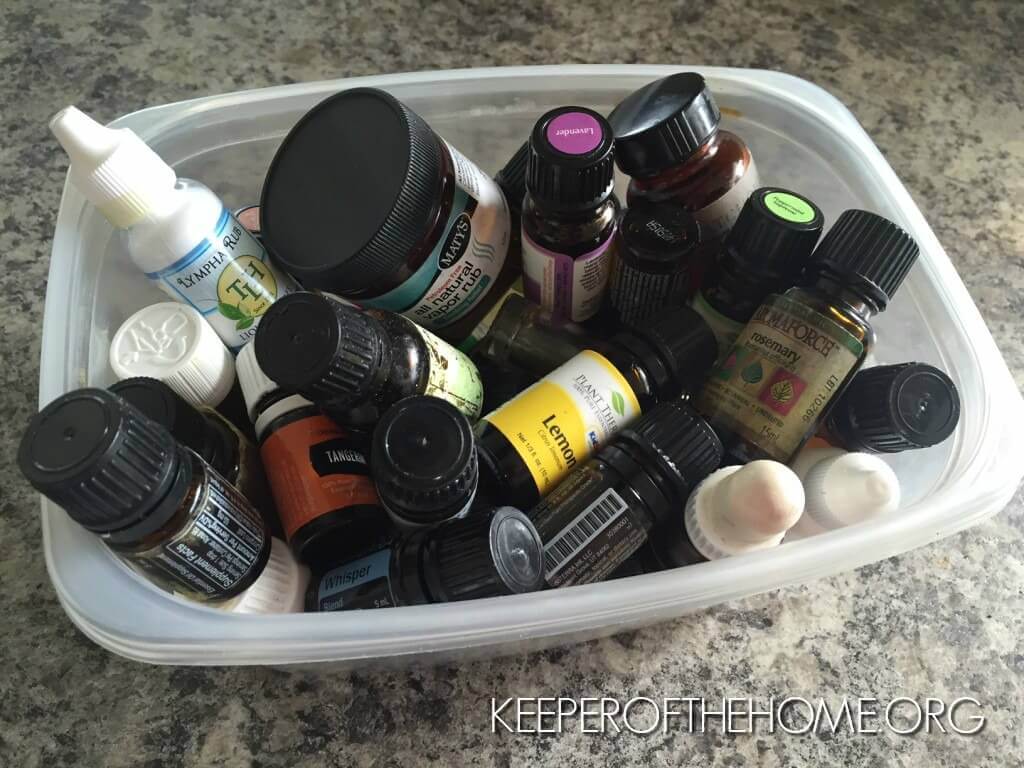
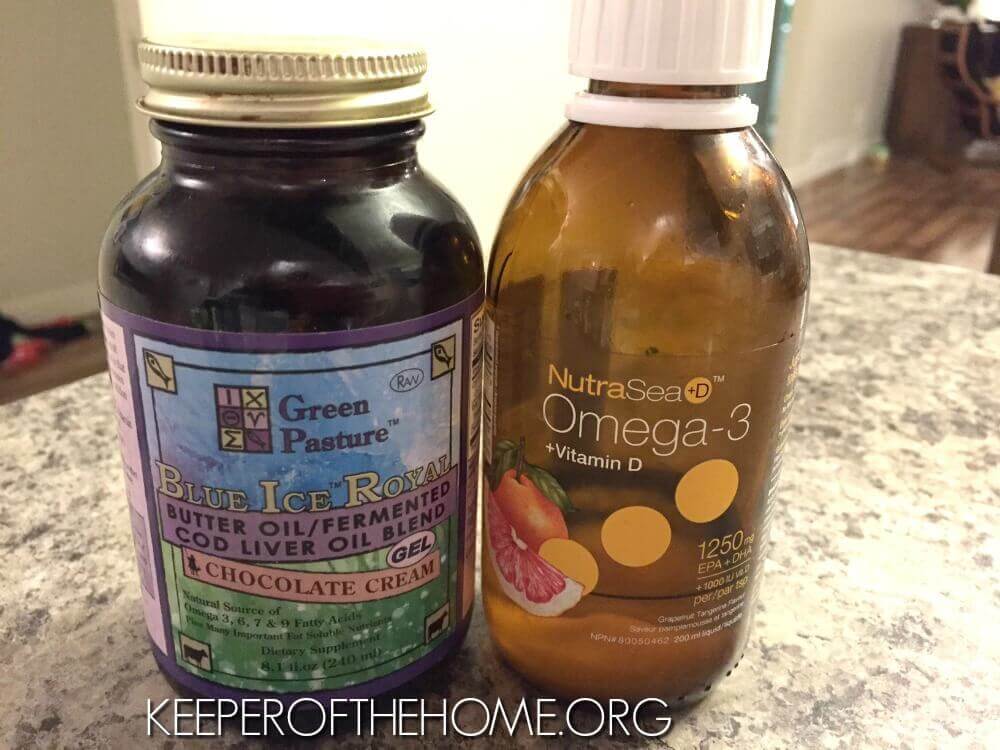


My problem is that I don’t really know how to use anything we have. We used to see a great naturopath but have since moved thousands of miles away! I’m hoping that some people here will have some ideas if we ever need anything….